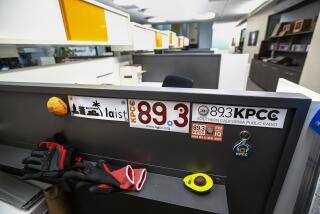Union: Send Us the $$$ : * Television: Would-be contributors to San Francisco’s KQED are asked to send dues to a NABET trust fund until a contract is signed.
- Share via
In an attempt to insulate its members from the tide of losses and cutbacks plaguing public television across the nation, a San Francisco labor union has mounted a highly unusual campaign against KQED, that city’s public television station.
The National Assn. of Broadcast Employees and Technicians (NABET) is asking would-be contributors to the station to send their membership dues not to KQED but to a special trust fund administered by the union. When the station and the union sign a new contract, the funds--with interest--will be turned over to KQED.
“It’s a message to people who are concerned about how the employees of their public television station are being treated,” said union president Kevin Wilson. He said that NABET members, who number about one-third of the stations 290 employees, have been working without a contract for about a year.
So far, Wilson said, the union has raised just $202--approximately equal to 5 regular memberships--in the week-old campaign, which has not yet been widely publicized. But he said that when the station’s August pledge drive begins, NABET will step up its efforts, buying advertisements to run in newspapers and on the sides of buses, urging people to send their pledges to the union.
KQED President Anthony Tiano said that the station is as concerned about the campaign as it would be about any potential loss in revenue, but that no reductions in contributions had yet been seen.
Tiano called the tactic “curious” and “wrongheaded,” but said that NABET was within its rights to use it.
Still, Tiano said, the union--which represents producers, technicians and clerks--has failed to recognize the severity of the station’s economic situation.
Like most of its public-television counterparts, including KCET Channel 28 in Los Angeles, KQED has suffered a severe drop in donations this year, mostly from reductions in funding from corporations and foundations.
According to Tiano, the station will end fiscal 1991 next month with a shortfall of more than $1 million in revenue. At the same time, the advertising revenue that KQED receives from its involvement with Focus, a San Francisco city magazine, is also off, he said.
Through layoffs and attrition, the station has trimmed its staff by 13 positions since February, and has cut its budget for producing local programs from about $6 million to $5.5 million.
At issue in the dispute with NABET are wages--the station wants to freeze wages for some employees and pay new producers less than current employees--and job security. The union wants the station to promise that it will limit its use of outside producers for local programs. The more KQED relies on free-lancers, Wilson said, the more likely the station will be to cut staff jobs.
Tiano, citing changes in the way PBS must do business in order to survive, did not dismiss that possibility.
“They’re trying to do what the railroad unions did and hold on to jobs that are no longer needed,” Tiano said. “There are hundreds, possibly thousands, of independent producers in the Bay Area who are scrambling to get programming on the air. These folks will work much cheaper than the folks we have on staff.
“That does not mean that KQED has moved all of its money to independent producers,” Tiano said. “But they need to understand that times are changing. And what used to be a nice, comfortable position for all of us in public broadcasting is no longer possible.”
More to Read
Sign up for Essential California
The most important California stories and recommendations in your inbox every morning.
You may occasionally receive promotional content from the Los Angeles Times.













